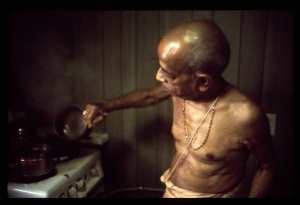SB 1.5.1: Difference between revisions
No edit summary |
(Vanibot #0054 edit - transform synonyms into clickable links, which search similar occurrences) |
||
| Line 25: | Line 25: | ||
<div class="synonyms"> | <div class="synonyms"> | ||
''sūtaḥ'' | ''[//vanipedia.org/wiki/Special:VaniSearch?s=sūtaḥ&tab=syno_o&ds=1 sūtaḥ]'' — Sūta; ''[//vanipedia.org/wiki/Special:VaniSearch?s=uvāca&tab=syno_o&ds=1 uvāca]'' — said; ''[//vanipedia.org/wiki/Special:VaniSearch?s=atha&tab=syno_o&ds=1 atha]'' — therefore; ''[//vanipedia.org/wiki/Special:VaniSearch?s=tam&tab=syno_o&ds=1 tam]'' — him; ''[//vanipedia.org/wiki/Special:VaniSearch?s=sukham&tab=syno_o&ds=1 sukham] [//vanipedia.org/wiki/Special:VaniSearch?s=āsīnaḥ&tab=syno_o&ds=1 āsīnaḥ]'' — comfortably seated; ''[//vanipedia.org/wiki/Special:VaniSearch?s=upāsīnam&tab=syno_o&ds=1 upāsīnam]'' — unto one sitting nearby; ''[//vanipedia.org/wiki/Special:VaniSearch?s=bṛhat&tab=syno_o&ds=1 bṛhat]-[//vanipedia.org/wiki/Special:VaniSearch?s=śravāḥ&tab=syno_o&ds=1 śravāḥ]'' — greatly respected; ''[//vanipedia.org/wiki/Special:VaniSearch?s=devarṣiḥ&tab=syno_o&ds=1 devarṣiḥ]'' — the great ''ṛṣi'' among the gods; ''[//vanipedia.org/wiki/Special:VaniSearch?s=prāha&tab=syno_o&ds=1 prāha]'' — said; ''[//vanipedia.org/wiki/Special:VaniSearch?s=viprarṣim&tab=syno_o&ds=1 viprarṣim]'' — unto the ''ṛṣi'' among the ''brāhmaṇas''; ''[//vanipedia.org/wiki/Special:VaniSearch?s=vīṇā&tab=syno_o&ds=1 vīṇā]-[//vanipedia.org/wiki/Special:VaniSearch?s=pāṇiḥ&tab=syno_o&ds=1 pāṇiḥ]'' — one who carries a ''vīṇā'' in his hand; ''[//vanipedia.org/wiki/Special:VaniSearch?s=smayan&tab=syno_o&ds=1 smayan] [//vanipedia.org/wiki/Special:VaniSearch?s=iva&tab=syno_o&ds=1 iva]'' — apparently smiling. | ||
</div> | </div> | ||
Latest revision as of 18:10, 17 February 2024

A.C. Bhaktivedanta Swami Prabhupada
TEXT 1
- sūta uvāca
- atha taṁ sukham āsīna
- upāsīnaṁ bṛhac-chravāḥ
- devarṣiḥ prāha viprarṣiṁ
- vīṇā-pāṇiḥ smayann iva
SYNONYMS
sūtaḥ — Sūta; uvāca — said; atha — therefore; tam — him; sukham āsīnaḥ — comfortably seated; upāsīnam — unto one sitting nearby; bṛhat-śravāḥ — greatly respected; devarṣiḥ — the great ṛṣi among the gods; prāha — said; viprarṣim — unto the ṛṣi among the brāhmaṇas; vīṇā-pāṇiḥ — one who carries a vīṇā in his hand; smayan iva — apparently smiling.
TRANSLATION
Sūta Gosvāmī said: Thus the sage amongst the gods [Nārada], comfortably seated and apparently smiling, addressed the ṛṣi amongst the brāhmaṇas [Vedavyāsa].
PURPORT
Nārada was smiling because he well knew the great sage Vedavyāsa and the cause of his disappointment. As he will explain gradually, Vyāsadeva's disappointment was due to insufficiency in presenting the science of devotional service. Nārada knew the defect, and it was confirmed by the position of Vyāsa.